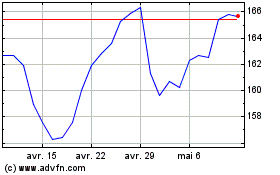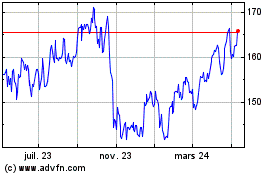Wind-Assisted Ship Propulsion System is an
LNG Shipping First
As part of their ongoing commitment to lower the carbon
intensity of their operations, Chevron Shipping Company LLC
(Chevron), a subsidiary of Chevron U.S.A. Inc., and Mitsui O.S.K.
Lines, Ltd. (MOL) announced an agreement to install Wind
Challenger, a hard sail wind-assisted ship propulsion system
developed by MOL and Oshima Shipbuilding together (Note 1), to a
new build LNG carrier under long term charter from MOL Encean Pte.
Ltd. (MOL’s 100% indirectly owned subsidiary) to Chevron Asia
Pacific Shipping Pte. Ltd. This vessel will mark the world’s first
LNG carrier equipped with Wind-Assisted Ship Propulsion
Systems.
This press release features multimedia. View
the full release here:
https://www.businesswire.com/news/home/20240913468521/en/
The Wind Challenger equipped LNG carrier
(Photo: Business Wire)
The vessel is under construction at the Geoje Shipyard of Hanwha
Ocean Co., Ltd. and is scheduled for delivery in 2026. In August
2024, MOL obtained an approval in principle (AiP) by Nippon Kaiji
Kyokai (Class NK) – a first for an LNG carrier with a Wind-Assisted
Ship Propulsion System (Note 2). The Chevron chartered vessel will
be the first application.
Wind Challenger will help reduce fuel consumption and GHG
emissions by using its unique telescopic sails.
In addition to the robust design of Wind Challenger itself,
additional safety measures include a fully enclosed navigation
bridge and a lookout station on the vessel’s fore deck to further
enhance visibility.
For tradability, the installation position of the Wind
Challenger aims to minimize impact on the existing design of
membrane type LNG Carriers. It will enable the retention of the
existing mooring arrangement unchanged and thereby minimize impacts
on ship shore compatibility, together with limited impact on the
vessel’s windage area.
“We’re proud to partner with MOL in Wind Challenger’s
industry-first LNG installation,” said Barbara Pickering, President
of Chevron Shipping Company. “This is another example of using
novel approaches in hard-to-abate sectors to reduce carbon
intensity in our LNG fleet.”
Takeshi Hashimoto, President, and CEO of Mitsui O.S.K. Lines,
said, “With the understanding and cooperation of Chevron, we are
delighted to be able to expand the Wind Challenger Project to LNG
carriers in addition to the two delivered Wind Challenger-equipped
bulkers (Note 3) and other ongoing projects (Note 4). Achieving GHG
reduction in the maritime transport of LNG, which is increasingly
in demand worldwide as a transition fuel, is a very important
mission for us. This project will undoubtedly be a significant
milestone towards achieving 'net-zero emissions by 2050', a medium
to long-term goal of the Mitsui O.S.K. Lines Group, as stated in
our 'Environmental Vision 2.2'.”
The Wind Challenger technology will be on exhibit at the MOL
booth at the Gastech Exhibition & Conference 2024 in Houston,
September 17-20. Information sessions on how the technology can be
applied to both LNG carriers and other vessels will also be
held.
<Vessel Outline>
Ship Owner
MOL Encean Pte. Ltd.
LOA / Breadth
About 286 m / About 46 m
Cargo Tank Capacity
About 174,000 m3
Shipyard
Hanwha Ocean Co., Ltd.
Wind Challenger
Specifications
Number of Sail: 2
Height: Up to 49 m (3-tier)
Width: About 15 m
Sail material: Fiber Reinforced
Plastic
(Note 1) For details, please refer to the following web site.
Wind Challenger: The Wind Assisted Ship Propulsion System |
SERVICES | Mitsui O.S.K. Lines, Ltd. Solutions (mol-service.com)
(Note 2) For details, please refer to the following press release.
MOL Obtains AiP for "LNG Carrier Installing Wind Challenger" - The
World's First Approval for an LNG Carrier - | Mitsui O.S.K. Lines
(Note 3) For details, please refer to the following press releases.
Delivery of SHOFU MARU, World's First Cargo Vessel equipped with
'Wind Challenger' Hard Sail | Mitsui O.S.K. Lines MOL Announces
Delivery of Bulk Carrier Green Winds, 2nd Vessel Equipped with Wind
Challenger Hard Sail Propulsion System | Mitsui O.S.K. Lines (Note
4) For details, please refer to the following press releases. Wind
Challenger to be Installed on Coal Carrier for J-Power - World's
1st Retrofit on an In-service Vessel - | Mitsui O.S.K. Lines Wind
Propulsion Systems will be Installed on 7 Vessels Operated by MOL
Drybulk - Steadily Pursuing to '25 Wind Challenger-equipped
Vessels' by 2030 - | Mitsui O.S.K. Lines
About Chevron:
Chevron is one of the world’s leading integrated energy
companies. We believe affordable, reliable and ever cleaner energy
is essential to enabling human progress. Chevron produces crude oil
and natural gas; manufactures transportation fuels, lubricants,
petrochemicals and additives; and develops technologies that
enhance our business and the industry. We aim to grow our oil and
gas business, lower the carbon intensity of our operations and grow
lower carbon businesses in renewable fuels, carbon capture and
offsets, hydrogen and other emerging technologies. More information
about Chevron is available at www.chevron.com.
About MOL:
MOL is a leading shipping company, operating on a global scale
with more than 800 vessels in service. The company develops various
social infrastructure businesses centered on ocean shipping, as
well as technologies and services to meet ever-changing social
needs including environmental protection. The MOL fleet includes
dry cargo ships, liquefied natural gas (LNG) carriers, car
carriers, and tankers. In addition to the traditional shipping
businesses, MOL also offers wellbeing & lifestyle businesses
such as real property, terminal operation, and ferry service, as
well as social infrastructure businesses such as logistics and
offshore wind power. With one of the largest merchant fleets and
about 140 years of history, experience, and technology, MOL will
make a leap forward to become a global social infrastructure
company, support people's daily lives from the blue ocean, open the
way to a prosperous future, and deliver new value to all
stakeholders. Website: https://www.mol.co.jp/en/
CAUTIONARY STATEMENTS RELEVANT TO FORWARD-LOOKING INFORMATION
FOR THE PURPOSE OF “SAFE HARBOR” PROVISIONS OF THE PRIVATE
SECURITIES LITIGATION REFORM ACT OF 1995
This news release contains forward-looking statements relating
to Chevron’s operations and lower carbon strategy that are based on
management’s current expectations, estimates, and projections about
the petroleum, chemicals and other energy-related industries. Words
or phrases such as “anticipates,” “expects,” “intends,” “plans,”
“targets,” “advances,” “commits,” “drives,” “aims,” “forecasts,”
“projects,” “believes,” “approaches,” “seeks,” “schedules,”
“estimates,” “positions,” “pursues,” “progress,” “may,” “can,”
“could,” “should,” “will,” “budgets,” “outlook,” “trends,”
“guidance,” “focus,” “on track,” “goals,” “objectives,”
“strategies,” “opportunities,” “poised,” “potential,” “ambitions,”
“aspires” and similar expressions, and variations or negatives of
these words, are intended to identify such forward-looking
statements, but not all forward-looking statements include such
words. These statements are not guarantees of future performance
and are subject to numerous risks, uncertainties and other factors,
many of which are beyond the company’s control and are difficult to
predict. Therefore, actual outcomes and results may differ
materially from what is expressed or forecasted in such
forward-looking statements. The reader should not place undue
reliance on these forward-looking statements, which speak only as
of the date of this news release. Unless legally required, Chevron
undertakes no obligation to update publicly any forward-looking
statements, whether as a result of new information, future events
or otherwise.
Among the important factors that could cause actual results to
differ materially from those in the forward-looking statements are:
changing crude oil and natural gas prices and demand for the
company’s products, and production curtailments due to market
conditions; crude oil production quotas or other actions that might
be imposed by the Organization of Petroleum Exporting Countries and
other producing countries; technological advancements; changes to
government policies in the countries in which the company operates;
public health crises, such as pandemics and epidemics, and any
related government policies and actions; disruptions in the
company’s global supply chain, including supply chain constraints
and escalation of the cost of goods and services; changing
economic, regulatory and political environments in the various
countries in which the company operates; general domestic and
international economic, market and political conditions, including
the military conflict between Russia and Ukraine, the conflict in
Israel and the global response to these hostilities; changing
refining, marketing and chemicals margins; actions of competitors
or regulators; timing of exploration expenses; timing of crude oil
liftings; the competitiveness of alternate-energy sources or
product substitutes; development of large carbon capture and offset
markets; the results of operations and financial condition of the
company’s suppliers, vendors, partners and equity affiliates; the
inability or failure of the company’s joint-venture partners to
fund their share of operations and development activities; the
potential failure to achieve expected net production from existing
and future crude oil and natural gas development projects;
potential delays in the development, construction or start-up of
planned projects; the potential disruption or interruption of the
company’s operations due to war, accidents, political events, civil
unrest, severe weather, cyber threats, terrorist acts, or other
natural or human causes beyond the company’s control; the potential
liability for remedial actions or assessments under existing or
future environmental regulations and litigation; significant
operational, investment or product changes undertaken or required
by existing or future environmental statutes and regulations,
including international agreements and national or regional
legislation and regulatory measures related to greenhouse gas
emissions and climate change; the potential liability resulting
from pending or future litigation; the risk that regulatory
approvals with respect to the Hess Corporation (Hess) transaction
are not obtained or are obtained subject to conditions that are not
anticipated by the company and Hess; potential delays in
consummating the Hess transaction, including as a result of
regulatory proceedings or the ongoing arbitration proceedings
regarding preemptive rights in the Stabroek Block joint operating
agreement; risks that such ongoing arbitration is not
satisfactorily resolved and the potential transaction fails to be
consummated; uncertainties as to whether the potential transaction,
if consummated, will achieve its anticipated economic benefits,
including as a result of regulatory proceedings and risks
associated with third party contracts containing material consent,
anti-assignment, transfer or other provisions that may be related
to the potential transaction that are not waived or otherwise
satisfactorily resolved; the company’s ability to integrate Hess’
operations in a successful manner and in the expected time period;
the possibility that any of the anticipated benefits and projected
synergies of the potential transaction will not be realized or will
not be realized within the expected time period; the company’s
future acquisitions or dispositions of assets or shares or the
delay or failure of such transactions to close based on required
closing conditions; the potential for gains and losses from asset
dispositions or impairments; government mandated sales,
divestitures, recapitalizations, taxes and tax audits, tariffs,
sanctions, changes in fiscal terms or restrictions on scope of
company operations; foreign currency movements compared with the
U.S. dollar; higher inflation and related impacts; material
reductions in corporate liquidity and access to debt markets;
changes to the company’s capital allocation strategies; the effects
of changed accounting rules under generally accepted accounting
principles promulgated by rule-setting bodies; the company’s
ability to identify and mitigate the risks and hazards inherent in
operating in the global energy industry; and the factors set forth
under the heading “Risk Factors” on pages 20 through 26 of the
company’s 2023 Annual Report on Form 10-K and in subsequent filings
with the U.S. Securities and Exchange Commission. Other
unpredictable or unknown factors not discussed in this news release
could also have material adverse effects on forward-looking
statements.
View source
version on businesswire.com: https://www.businesswire.com/news/home/20240913468521/en/
Christine Dobbyn External Affairs Advisor, Chevron Tel: +1
281-906-1499 christinedobbyn@chevron.com
Mitsui O.S.K. Lines, Ltd. Corporate Communications Division,
Media Relations Team E-mail: mrtmo@molgroup.com/TEL:
03-3587-7015
Chevron (NYSE:CVX)
Graphique Historique de l'Action
De Nov 2024 à Déc 2024

Chevron (NYSE:CVX)
Graphique Historique de l'Action
De Déc 2023 à Déc 2024
